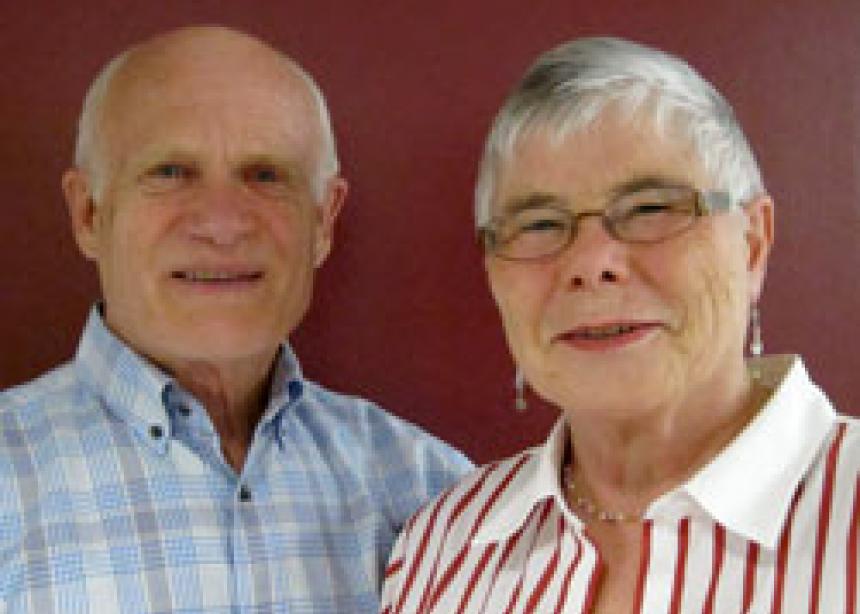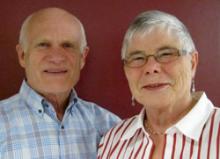North American churches forget how special Anabaptism is, say Erwin and Marian Wiens, recently returned from Korea.
The Wienses are no strangers to South Korea. Ten years ago, they served with Mennonite Church Canada as church development leaders in the Jesus Village Church (JVC) in Chuncheon. In 2010, they returned as Resource Workers to serve at the Korea Anabaptist Center and discovered that those seeds have borne fruit.
Anabaptist theology and its grass-roots, biblically based approach to life has generated plenty of interest in the early church model. “There are so many mega churches [in South Korea] where there isn’t community or networking, where people feel like spectators,” Erwin says. “The broader church emphasizes salvation in terms of sacrificial atonement of Christ for sin, but there is no instruction about Jesus’ life or teachings.” The early church model is different. “The appeal of that kind of community-based church is strong,” Erwin says.
In 2002, about 50 people regularly attended worship services at JVC. By the time the Wienses returned in 2010, attendance had doubled and more women were involved in leadership—a direct result of Marian’s example, the congregation says.
JVC is thinking strategically about the years ahead. Rather than risk growing into a larger, less personal entity, the entire congregation is being trained as servant leaders so that they can divide and multiply. To ensure they maintain a “priesthood of all believers”, (1 Peter 2:9) JVC has avoided the one-person-in-charge scenario through the leadership of four couples rather than hiring pastors.
The Wienses report that Anabaptism is also influencing the way other church communities serve. Daejeon, located in the heart of South Korea, has a population of one million, with 500 Baptist churches in the region. Dream Community Church may seem small by comparison, with about 75 members, but the congregation specializes in ministry for severely handicapped children and young adults. In Busan, the Hanwoori Church, related to the Church of the Brethren, operates on a model of simplicity. They meet frequently in smaller groups, but also meet once a month as a larger congregation.
Korean Anabaptists have a strong relationship to scripture. “At JVC, weekly bulletins list the readings for each day. They take it very seriously,” Erwin says.
The Wienses have many stories to share about their encounters with people curious about Anabaptism—from a growing relationship with a women they encountered during daily subway travel to Yong Ha Bae, a Korean publisher who was so interested in Anabaptist materials that he published a Korean translation of The Naked Anabaptist. It was released in 2011 and has been inspiring people across the country since. He also made arrangements with Herald Press to publish future Korean translations of their Anabaptist materials.
And then there is the story of Jimmy Kim. Before the Wienses returned to South Korea, Erwin pastored at Trinity Mennonite Church in Calgary. Jimmy came from South Korea to visit his aunt and uncle who worshipped there. He had left his wife and young daughter to seek a divorce. Through conversation with Erwin, Jimmy learned more about New Testament teachings of grace and love, which contrasted sharply with what he had learned about Old Testament law. “It really grabbed his heart and he decided to give his marriage another chance,” Erwin says.
When the Wienses met up with Jimmy upon their return to South Korea, they discovered that he had recommitted to his wife and daughter, and the couple now have an infant son. “Jimmy said ‘I will stay committed to this marriage because of God’s grace,’” Erwin recalls.
The interest in Anabaptism is spreading. “We were surprised and amazed that there was so much interest,” Marian says. “Anabaptism is a jewel. I think Canadian and American churches forget the specialness of it, but Koreans are seeing that. They may be idealistic about it but they are attracted to what it represents.”






Add new comment
Canadian Mennonite invites comments and encourages constructive discussion about our content. Actual full names (first and last) are required. Comments are moderated and may be edited. They will not appear online until approved and will be posted during business hours. Some comments may be reproduced in print.